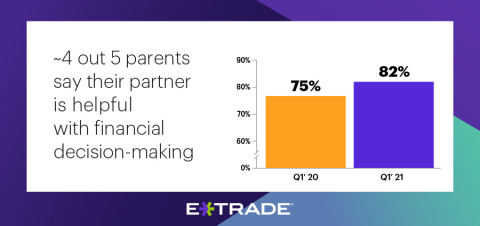Teamwork Makes the Dream Work: Coupled Parents Increasingly Working Together to Manage Finances Through Pandemic
E*TRADE Financial Holdings recently released findings from its quarterly StreetWise study, highlighting how coupled parents navigate financial decisions during these disruptive times. Key findings include:
- 82% of coupled parents find their spouse helpful in financial decision-making, a 7 percentage point increase from last year.
- More than half (55%) frequently discuss investing, a 6 percentage point rise.
- 43% feel guilt after making decisions without consulting their partner, up 4 percentage points.
- While 70% are comfortable with their spouse making decisions alone, this is down 5 percentage points.
- Increased communication about finances among couples enhances collaborative decision-making.
- The emphasis on saving for emergencies and education reflects a proactive financial strategy.
- A decline in comfort levels regarding independent financial decision-making may indicate rising tensions among couples.
Insights
Analyzing...
E*TRADE Financial Holdings, LLC today announced results from the most recent wave of StreetWise, the E*TRADE quarterly tracking study of experienced investors. As Valentine’s Day approaches, the study looked at how parents with a partner or spouse have managed their financial decisions amid a year of disruptions:

More coupled parents frequently discuss finances and rely on each other as families juggle remote work and learning (Graphic: Business Wire)
-
More parents value a helping hand from their spouse. Over four out of five coupled parents (
82% ) say their spouse is helpful when it comes to financial decision-making, up 7 percentage points from last year. -
More have opened lines of communication. Over half of parents who share investing decisions with a partner (
55% ) say they discuss investing with them frequently, up 6 percentage points from last year. -
Regret over lone decision-making increased. Over two in five coupled parents (
43% ) said they feel guilty after making a financial decision without telling their partner, increasing 4 percentage points from last year. -
Coupled parents are less okay handing over the reins on investment decision-making. While the majority (
70% ) are comfortable with their spouse making a financial decision without their input, the population ticked down 5 percentage points from last year.
“In unpredictable and chaotic times like we’ve experienced recently, it is encouraging to see parents working together,” said Mike Loewengart, Managing Director of Investment Strategy at E*TRADE Financial. “Even in the most predictable of times, parents must build towards a myriad of financial needs for today and tomorrow—including everyday expenses, saving for education, housing, and retiring someday, just to name a few. Successful financial planning in today’s environment can only come from working together and communicating often about goals, priorities, and their combined risk tolerance.”
Mr. Loewengart provided additional steps that parents may consider in planning for their family’s future:
- Surprise expenses abound—plan ahead. If the pandemic has taught us anything it’s to expect the unexpected, and children can add to unforeseen expenses. Saving a little each week in an emergency fund can help ease the burden—three to six months of living expenses is a solid goal.
- Begin saving for education now. Funding a dedicated education account like a Coverdell Education Savings Account for children at a young age can help when the time comes and can potentially provide some tax advantages. Further, the power of compounding can be a tremendous asset for those with a long-term horizon.
- Keep retirement saving on track. Retirement doesn’t have to take a backseat to meeting the financial needs of today. It’s natural for parents to focus their resources on their children, but they can help their children’s financial futures when they create a solid financial foundation for themselves. Take advantage of your company’s retirement plan and matching contributions, if offered. If not available, explore other tax-advantaged accounts like IRAs.
E*TRADE aims to enhance the financial independence of traders and investors through a powerful digital offering and professional guidance. To learn more about E*TRADE trading and investing platforms and tools, visit etrade.com.
For useful trading and investing insights from E*TRADE, follow the company on Twitter, @ETRADE.
About the Survey
This wave of the survey was conducted from January 1 to January 7 of 2021 among an online US sample of 904 self-directed active investors, of which 153 are parents with a partner or spouse who split investing decisions, who manage at least
About E*TRADE Financial Holdings, LLC and Important Notices
E*TRADE Financial Holdings, LLC and its subsidiaries provide financial services including brokerage and banking products and services to retail customers. Securities products and services are offered by E*TRADE Securities LLC (Member SIPC). Commodity futures and options on futures products and services are offered by E*TRADE Futures LLC (Member NFA). Managed Account Solutions are offered through E*TRADE Capital Management, LLC, a Registered Investment Adviser. Bank products and services are offered by E*TRADE Bank, and RIA custody solutions are offered by E*TRADE Savings Bank, both of which are national federal savings banks (Members FDIC). More information is available at www.etrade.com.
The information provided herein is for general informational purposes only and should not be considered investment advice. Past performance does not guarantee future results.
E*TRADE Financial, E*TRADE, and the E*TRADE logo are registered trademarks of E*TRADE Financial Holdings, LLC. ETFC-G
ETFC
© 2021 E*TRADE Financial Holdings, LLC, a business of Morgan Stanley. All rights reserved.
E*TRADE Financial engages Dynata to program, field, and tabulate the study. Dynata provides digital research data and has locations in the Americas, Europe, the Middle East and Asia-Pacific. For more information, please go to www.dynata.com.
Referenced Data
How helpful is your partner in financial decision making? |
|||
|
Total |
W/ Kids
|
W/ Kids
|
Top two box |
|
|
|
Very helpful |
|
|
|
Somewhat helpful |
|
|
|
A little helpful |
|
|
|
Not helpful |
|
|
|
Bottom two box |
|
|
|
How often do you discuss your portfolio and investing with your spouse or partner? |
|||
|
Total |
W/ Kids
|
W/ Kids
|
Top two box |
|
|
|
Always |
|
|
|
Frequently |
|
|
|
Sometimes |
|
|
|
Rarely |
|
|
|
Never |
|
|
|
How frequently do you make investing decisions without telling your partner that you later felt guilty about? |
|||
|
Total |
W/ Kids
|
W/ Kids
|
Top two box |
|
|
|
Always |
|
|
|
Frequently |
|
|
|
Sometimes |
|
|
|
Rarely |
|
|
|
Never |
|
|
|
How comfortable are you with your partner making an investing decision without your input? |
|||
|
Total |
W/ Kids
|
W/ Kids
|
Top two box |
|
|
|
Very comfortable |
|
|
|
Somewhat comfortable |
|
|
|
Somewhat uncomfortable |
|
|
|
Very uncomfortable |
|
|
|
Bottom two box |
|
|
|
View source version on businesswire.com: https://www.businesswire.com/news/home/20210212005247/en/






